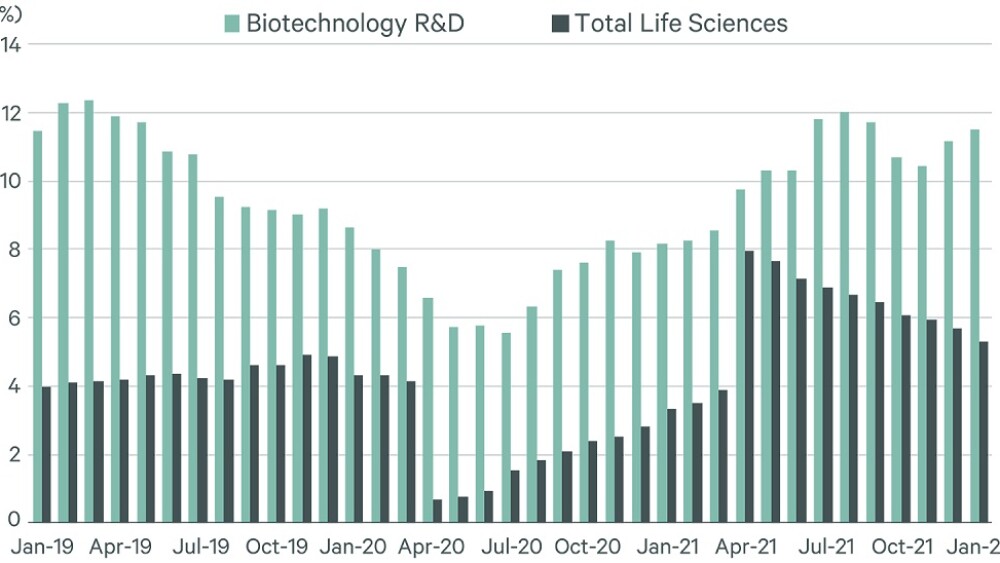Since 2020, the life sciences industry has worked to rebound from the COVID-19 pandemic. But one sector’s growth has far outpaced the others–the biotech industry.
Since 2020, the life sciences industry has collectively worked to rebound from the COVID-19 pandemic. But one sector has managed to not only build back what was lost, but also experience substantial growth–the biotech industry.
Overall, the number of employees working in the U.S. life sciences industry grew by 5.3% from January 2021 to January 2022, according to the U.S. Bureau of Labor Statistics. This growth is slightly higher than the national job growth of 4.7%. However, both of these statistics pale in comparison to the biotech research and development industry–it experienced 11.5% growth in the same time frame.
According to a report from CBRE, a commercial real estate company, an increase in job growth for lab workers and researchers often coincide with increased demand for life sciences real estate. This makes logical sense; when biotechs expand and open new facilities, they hire more employees to fill them.
As an example, CBRE states that in the Boston-Cambridge market, the largest U.S. life sciences hub, employment grew from nearly 81,000 in 2016 to 104,000 in 2020. The company tracked similar growth in San Diego.
For those familiar with the biotech industry, these statistics are hardly surprising. Since the beginning of 2022, many biotech companies have announced plans to expand and add more jobs.
For example, as BioSpace previously reported, Astellas celebrated the opening of its newest facility in Sanford, NC, on June 8. Similarly, Merck is adding 160,000 square feet and 100 new employees to its facility in Cambridge, MA. Also in Cambridge, Sanofi officially opened the doors to a cutting-edge 900,000-square-foot campus at Cambridge Crossing.
This growth is nothing new for the biotech industry. Excluding a dip in employment in 2020, the sector has experienced regular growth for several years. CBRE provided the following illustration to show the biotech industry’s growth compared to the life sciences industry as a whole.
Courtesy of U.S. Bureau of Labor Statistics, CBRE Research, March 2022.
So, what does this mean for the biotech industry moving forward? And what are the implications for those looking to break into biotech? While there’s no guarantee of what the future holds, the growth data from 2019 onward suggests this expansion in labor will continue.
For those looking to break into the biotechnology field, this means an increase in available jobs. As for the skills necessary to be successful in biotech, most biotechnology jobs rely heavily on research and analysis, meaning applicants should display experience that highlights that skill set.
As BioSpace previously reported, on top of those skills, many biotech recruiters expect their applicants to have a Bachelor’s degree in biotechnology or a related field, like biology, chemistry or natural sciences. Some positions, like those in the agricultural and food science fields, may accept an Associate’s Degree instead. Some will also consider applicants who have certificates in biotechnology.
Professionals who work in advanced scientist positions will often have a Master’s degree or a Ph.D. in the topic of the field they are covering. People who have worked in the field at length will commonly move to a manager or postsecondary teaching position later in their career.
Overall, this trend of growth and expansion is good news not only for biotechs but for the people they employ. If you’ve been thinking about making the switch to a career in biotech, now may be the perfect time.






